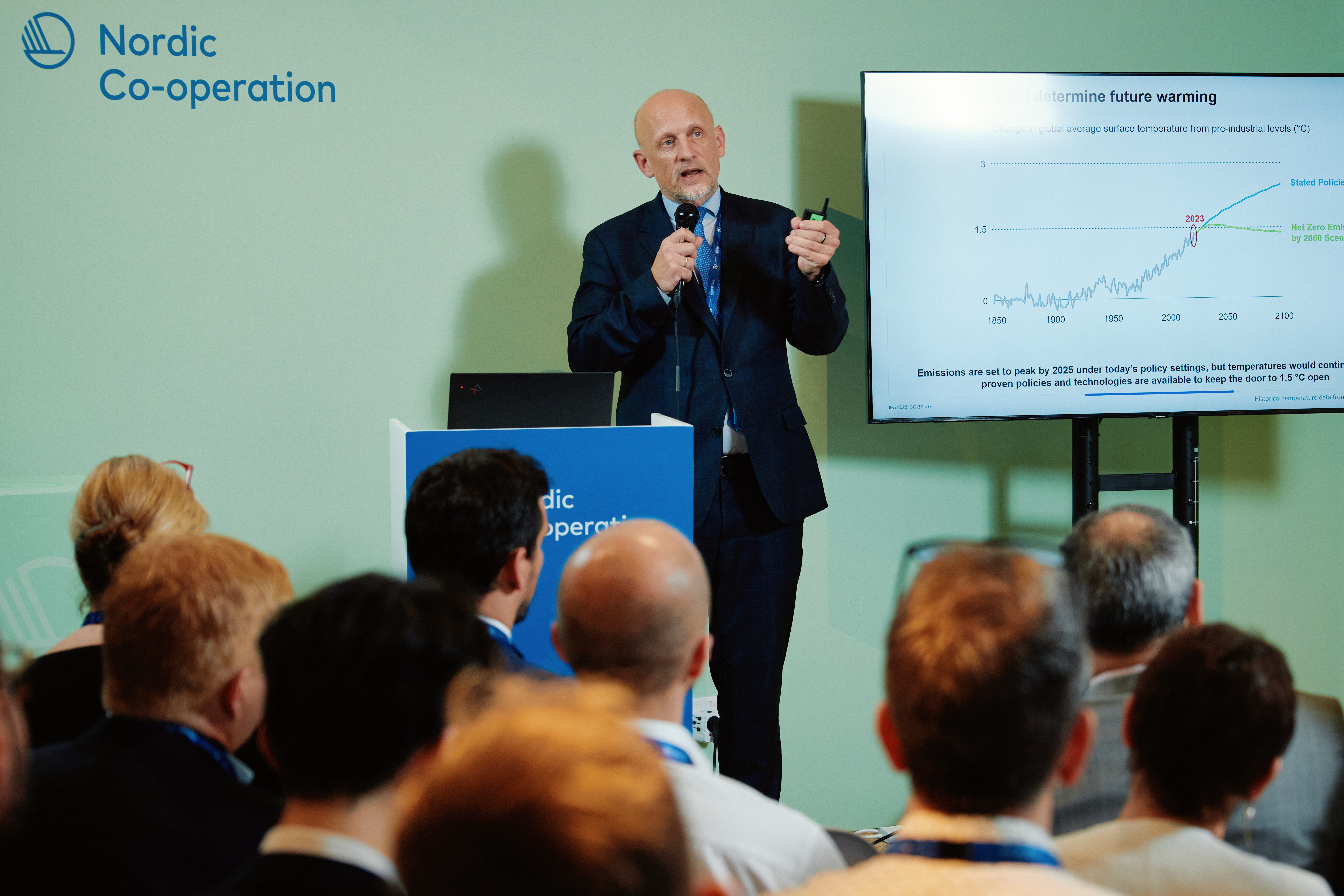
Keeping the door open for the 1,5°C goal
The Nordic Pavilion at COP28 was filled to the brim when Nordic Energy Research, together with the IEA, held the session World Energy Outlook 2023 on 5 December. This annual…
The Nordic Pavilion at COP28 was filled to the brim when Nordic Energy Research, together with the IEA, held the session World Energy Outlook 2023 on 5 December. This annual joint session has been a tradition since the COP in Paris in 2015. Participating in the session were Tim Gould, Chief Energy Economist, IEA, Thiago Barral, Secretary of Energy Planning and Transition, Ministry of Mines and Energy, Brazil, Jean-Denis Charlebois, Chief Economist, Canada Energy Regulator, Jason Bordoff, Founding Director of the Center on Global Energy Policy, and the Swedish Minister for Energy, Business and Industry and Deputy Prime Minister, Ebba Busch.
Keeping the door open for the 1,5°C goal
IEA’s Chief Energy Economist, Tim Gould started the session with a presentation of highlights from the IEA flagship report, World Energy Outlook 2023. In his deep dive into what needs to happen at the COP28 climate conference in Dubai to keep the door open for the 1.5°C goal, Gould said, “Ten years ago, 70 percent of the world’s energy was produced with fossil fuels. Now we’re closer to 60 percent, but there are big changes happening also there, so by the end of this decade we’re well under 50 percent, heading for a 40 percent share of fossil fuels in global electricity generation”.

Continuing, Gould pointed out what implications China’s rapid change have for the world. “China’s changing, and that will have big implications for energy development going forward. China is a clean energy powerhouse. Pretty much half of the wind and solar that is going to be deployed this year around the world is going to be in China. More than half of the electric vehicle sales are taking place in China, and China’s growth is changing as well. That very infrastructure-led, energy-intensive model of development is changing, so we’re going to see a different quality of growth that is more reliant on electricity and less reliant on those very energy-intensive industry processes that produce so much steel and cement, as China builds out this world-class infrastructure.”
Peak in demand for all fossil fuels at end of the decade
As China changes, so does the world, and the IEA report predicts that the peak of demand for fossil fuels will peak at the end of the decade, even though there are a lot of moving parts that might affect the outcome. The ongoing solar boom in many of the developing countries is one of the reasons why the report’s prediction might become true, and by the end of the 2030 decade, 1 000 GW of solar PV modules might be installed world-wide. It should be emphasized that you can’t just push more solar into the grid; you also need to expand your ability to operate these power systems. Finishing his presentation, Gould said that there are a lot of encouraging shifts that are happening, but the investments in clean energy would need to triple by 2030 to keep the 1.5°C goal within reach.
National reflections on IEA’s report

Panel from left to right: Thiago Barral, Secretary of Energy Planning and Transition, Ministry of Mines and Energy, Brazil, Jean-Denis Charlebois, Chief Economist, Canada Energy Regulator, Jason Bordoff, Founding Director of the Center on Global Energy Policy, Tim Gould, Chief Energy Economist, IEA.
Jason Bordoff, Founding Director of the Center on Global Energy Policy, started the panel discussion by giving his reflections on this year’s report, noting, “There is a new era of geopolitical tensions that reminds us why we should move much faster to a clean energy future that is not only about the threat of climate change but can be one that chances energy security”.
Moving over to national perspectives, Jean-Denis Charlebois, Chief Economist, Canada Energy Regulator, pointed out that although Canada was the fifth largest oil producer in 2022, the country has an ambitious climate agenda. On the Canadian electricity system, Charlebois said that the demand will more than double to 2050. This is a somewhat slower pace than what the IEA sees globally, but that is due to Canada having a larger degree of electrification already. The Brazilian Secretary of Energy Planning and Transition, Ministry of Mines and Energy, Thiago Barral, raised several key elements why Brazil is a promising country when it comes to contributing to the energy transition: the country’s longstanding tradition of policies for renewable energy, exemplified with biofuels, and the new mandate for sustainable aviation fuels on domestic flights starting in 2027.
Upcoming Swedish Presidency of the Nordic Council of Ministers set to prioritize energy cooperation
In her closing remarks, the Swedish minister for Energy, Business and Industry and Deputy Prime Minister, Ebba Busch, highlighted the value that external analysis brings to national policymaking. “However, we cannot settle on our achievements. Uncertainties from the conflicts and a very volatile global economy mean that we still have to remain prepared.” She continued by noting that there are two key take-aways in the IEA report: that the door to limit global warming to 1.5°C is still open, and that we for the first time will actually be able to witness a peak and the start of a decline in the use of fossil fuels.

Ebba Busch, Minister for Energy, Business and Industry and Deputy Prime Minister, Sweden.
“We look very much forward to taking over the presidency of the Nordic Council of Ministers in 2024 and leading the cooperation forward in a safer, greener, and freer Nordic region. That will be the focus of the Swedish Presidency”, Busch said, emphasizing that in the energy area, Sweden will pay particular attention to electricity market cooperation and electrification.

